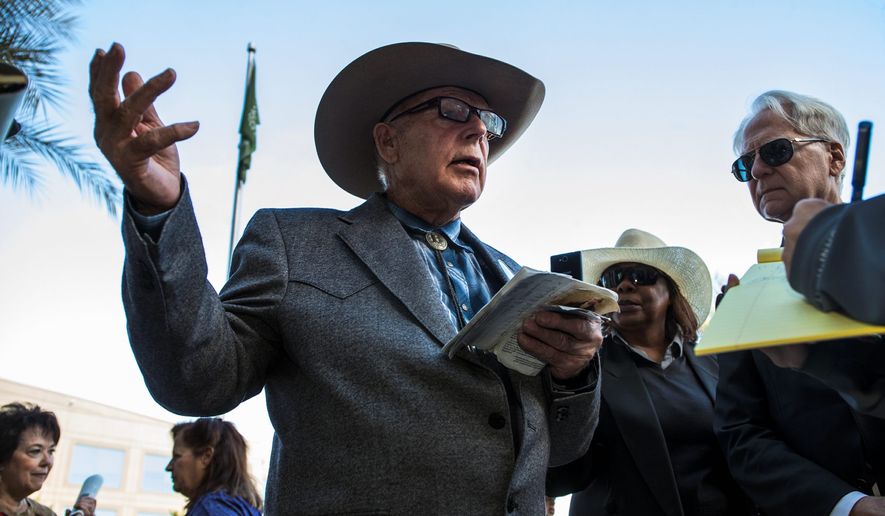It’s hard to imagine how the 2014 federal effort to impound Cliven Bundy’s cattle could have gone any worse, but environmentalists are demanding that the Bureau of Land Management go back and try it again.
Days after a federal judge threw out the case against Mr. Bundy and two of his sons, environmental groups urged Interior Secretary Ryan Zinke to remove the family’s cattle from the property near Bunkerville, Nevada.
“We urge Interior not to leave this business unfinished. Time is of the essence,” reads the letter to Mr. Zinke on Wednesday. “Interior must round up these cattle to ensure that a pattern of lawlessness backed up by violence does not perpetuate itself across the public lands of the Western U.S.”
In response, Bundy attorney Larry Klayman replied: “I would say, make our legal day.”
Perhaps the only silver lining from the 2014 Nevada standoff was that it didn’t end in bloodshed after hundreds of Bundy supporters descended on the ranch, prompting the BLM to cancel its effort to impound 400 head of cattle over Mr. Bundy’s refusal to pay federal grazing fees.
Environmentalists slammed Mr. Bundy as a lawbreaker engaged in “illegal grazing on public lands,” while Mr. Klayman blasted them as “vicious leftist vigilantes that have no respect for ordinary folk or ranchers like Cliven Bundy.”
While green groups have zeroed in on the Bundys, Republican lawmakers are taking a hard look at the BLM in the aftermath of the trial, which revealed allegations of misconduct and bias, including religious discrimination, by agents against the Mormon ranching family.
Two House Republicans — House Natural Resources Committee Chairman Rob Bishop and Oversight and Investigations subcommittee Chairman Bruce Westerman — have asked BLM interim Director Brian Steed for information on the agency’s “apparent culture of impunity for law enforcement misconduct.”
“The failures in the Bundy case and previous cases display serious misconduct by BLM law enforcement officials, and strongly suggest there are systemic issues within BLM’s law-enforcement operations,” they said in their letter Wednesday.
The lawmakers gave Mr. Steed until Jan. 24 to reply with a briefing for committee staff as well as “any updates to BLM policy or guidelines.”
The collapse of the Bundy case came as a stunning defeat for federal prosecutors, who were admonished by U.S. District Chief Judge Gloria Navarro for withholding potentially exculpatory evidence in her decision to dismiss the charges against the four defendants.
A case that once seemed like a slam-dunk for the prosecution fell apart amid evidence of misconduct as outlined in a Nov. 27 whistleblower memo from BLM special agent Larry Wooten, and the loss of the government’s star witness, former BLM agent-in-charge Dan Love.
Mr. Wooten accused Mr. Love of running “the most intrusive, oppressive, large scale and militaristic trespass cattle impound possible,” ignoring directives to the contrary from state and federal authorities.
Mr. Love, who led the April 2014 operation to impound 400 head of cattle, was fired shortly after an Aug. 24 report by the Office of Inspector General found he had pilfered artifacts, finagled Burning Man festival tickets for family and friends, and pressured subordinates to cover up wrongdoing.
“Approximately 91 percent of people charged with a federal crime are found guilty and 77 percent of people standing trial are convicted,” said the House letter. “The failure of prosecutors to achieve a conviction in the Bundy case raises questions about the conduct of BLM law enforcement and their ability to carry out effective, fair, and professional law enforcement investigations.”
Environmentalists said none of that should absolve Mr. Bundy, 71, who has refused to pay an estimated $1.3 million in grazing fees over his contention that the land belongs to Clark County, not the federal government, despite court rulings against him. “Bundy is still an outlaw when it comes to his grazing actions, and the prosecutorial failings in the Bunkerville case do not excuse him from the decades of unauthorized livestock trespass on our public lands,” Greta Anderson, deputy director of Western Watersheds Project, said in a statement. “BLM needs to enforce the law and remove his cattle, which are destroying habitat for threatened species.”
Other groups urging Mr. Zinke to impound the Bundy cattle include the Center for Biological Diversity, WildEarth Guardians and Public Employees for Environmental Responsibility.
Mr. Klayman said the rancher plans to file a lawsuit in Nevada state court shortly aimed at settling the dispute over the land’s ownership.
Running cattle in the dry, arid region became problematic after the Fish and Wildlife Service listed the local desert tortoise as threatened in 1989, prompting other ranching operations to move, a point made during Mr. Bundy’s press conference Wednesday in Las Vegas.
“Someone asked a question, ’What about all those other ranchers that are paying grazing fees?’ And somebody else shouted out, ’Well, there are no other ranchers. Cliven’s the only one left,’” said Mr. Klayman. “I would call it Bundy’s last stand.”
• Valerie Richardson can be reached at vrichardson@washingtontimes.com.




Please read our comment policy before commenting.